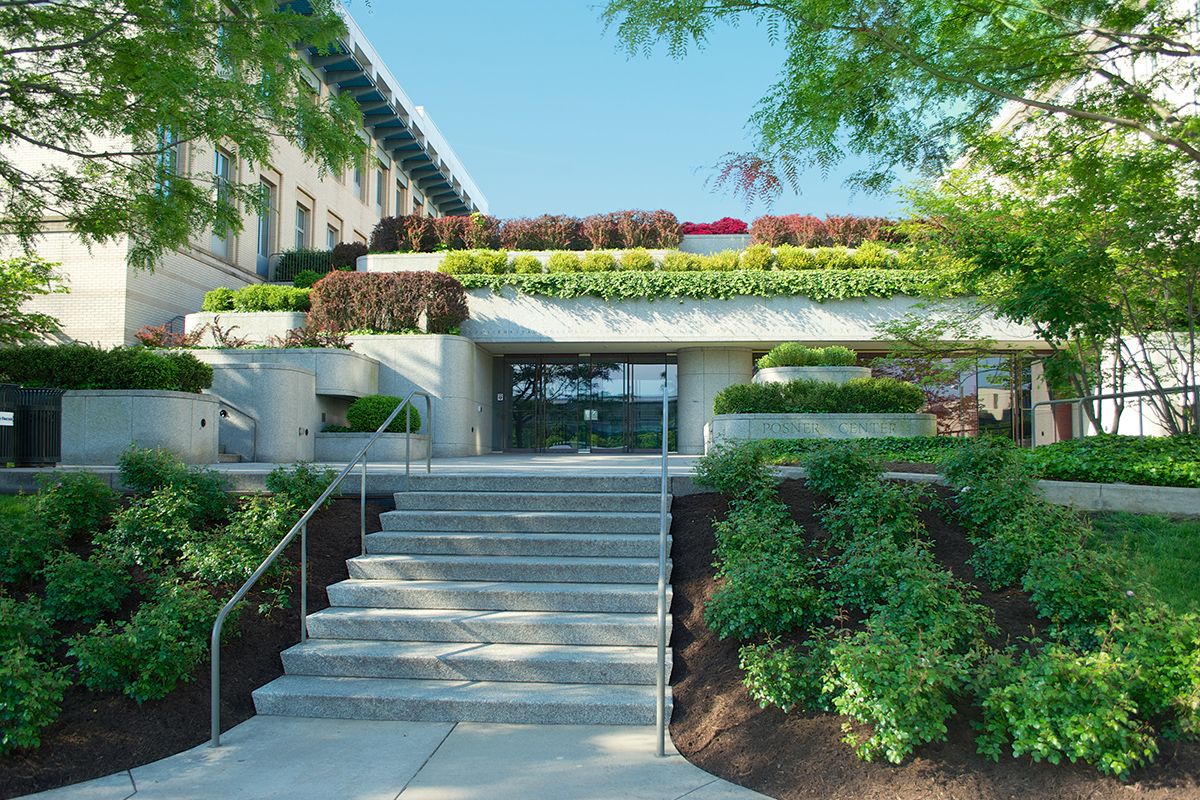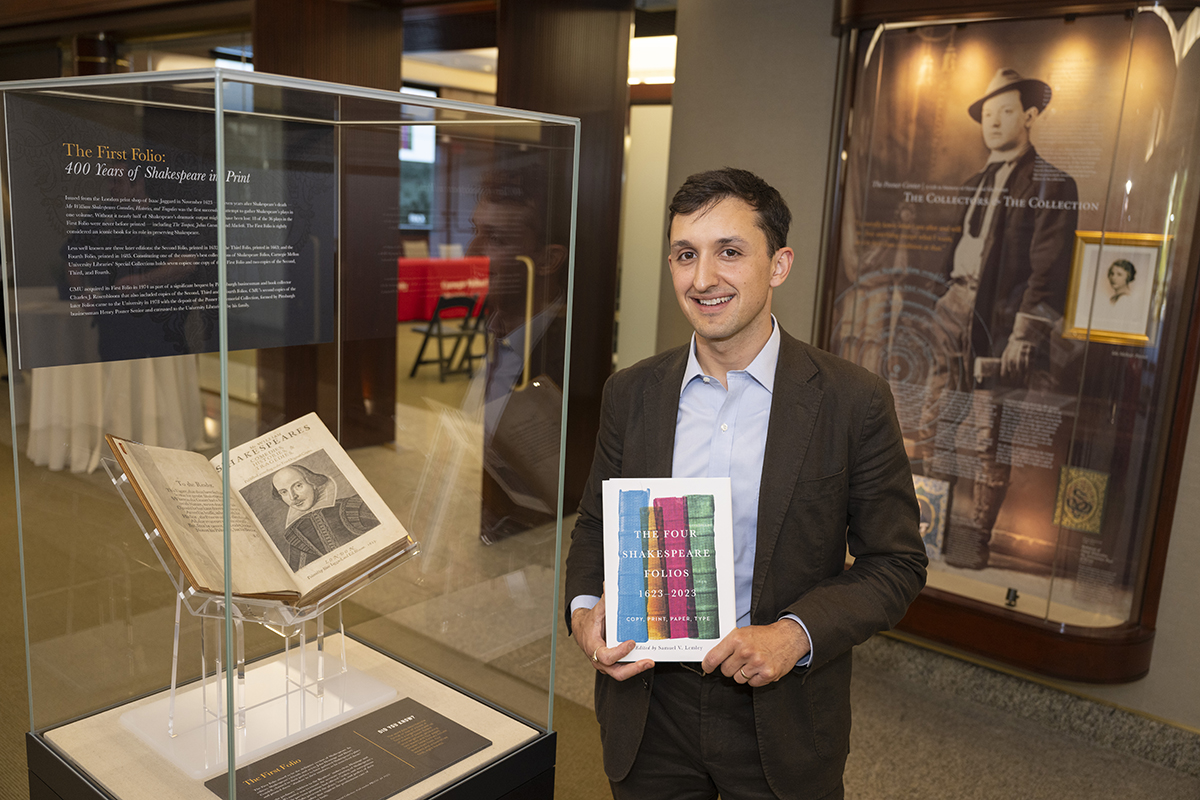
Posner Center is located between the College of Fine Arts and Posner Hall,
facing Margaret Morrison Carnegie Hall and the tennis courts.
The Posner Foundation of Pittsburgh has announced an $8 million commitment to support the Carnegie Mellon University Libraries Special Collections — the university’s repository for rare books, manuscripts, and early calculating devices and cryptographic machines.
“We are deeply grateful to the Posner Foundation and the Posner family for this incredible commitment and for their steadfast support of Carnegie Mellon University,” said Farnam Jahanian, president of Carnegie Mellon University. “Our special collections program offers a unique window into some of our nation’s greatest minds and milestones, and we are thrilled to continue advancing this work and elevating access to our intellectual and cultural treasures for the benefit of generations to come.”
The commitment apportions $6 million to renovate the Posner Center for Special Collections and $2 million to support the care, display, and usage of the Libraries’ Special Collections.
A History of Transformative Support
The Posner family has a long history as benefactors of the University Libraries. The late Helen Posner was instrumental in selecting the University Libraries to hold the family’s personal collection of rare books and artifacts, which forms the core of Special Collections’ holdings in early science and technology. CMU Trustee Anne Molloy, who is also a trustee of the Posner Foundation and the wife of its chairman, Henry Posner III, serves on the Libraries’ Dean’s Advocacy Council.
“The University Libraries has cultivated a multi-faceted role both at CMU and beyond, and continue to showcase the power of imagination and curiosity through unique collections, world-class exhibitions, and groundbreaking research,” Molloy said. “Past generations of Posners have been deeply committed to furthering that impact, and we are proud to play a part in this continuing story of discovery and innovation.”
Support from the Posner family has also enabled the reinvention of library services and facilities to fully leverage the possibilities of promoting education and research in the digital era. In 2021, the Foundation established the Helen and Henry Posner, Jr. Dean’s Chair for the University Libraries as part of a $16 million gift to Carnegie Mellon. Carnegie Mellon installed Keith Webster as the inaugural Helen and Henry Posner, Jr. Dean's Chair for the University Libraries the following year.
“Thanks to the continued generosity of the Posner family, the University Libraries has been uniquely situated to re-envision the future of an academic library in the 21st century, from championing open access and open science initiatives to supporting the research life cycle from grant application to sharing research results,” Webster said. “With this additional support for our Special Collections, we will be able to take our stewardship of rare and historical books and artifacts to the next level, offering transformative and accessible new ways for treasures of the past to contribute to the breakthroughs of the future.”
The Posner Center for Special Collections Renovation Fund
A total of $6 million will be allocated to create the Posner Center for Special Collections Renovation Fund to support the Center’s renovation, including design, construction, outfitting, and equipment costs.
The Posner Center is an 11,400-square-foot, earth-sheltered building designed by Paul Whitehead of WTW Architects. Constructed in 2004, this LEED-certified facility was a gift of Henry and Helen Posner Jr. in memory of Henry Posner Sr. and his wife Ida.
Today, the center provides museum-quality storage and exhibit space for the Posner Memorial Collection, and its rooftop is home to Kraus Campo, a meditative outdoor space created by artist Mel Bochner (CFA 1962) and landscape architect Michael Van Valkenburgh.
The forthcoming renovation, which is scheduled to conclude in fall 2025, will reimagine the center as part museum and part laboratory for the humanities. The completed facility will serve as both a scholarly and community resource and aim to elevate the collection’s impact on research, student, and public experiences.
“This gift represents a transformational investment in Special Collections,” said Curator of Special Collections Sam Lemley. “Following the renovation of the Posner Center, the University will have a premier and dedicated space to host students, researchers, and events that elevate the profile of the collection and facilitate pathbreaking work with the University’s rare books and early technologies.”

Curator of Special Collections Sam Lemley at the launch event for
“The Four Shakespeare Folios, 1623–2023: Copy, Print, Paper, Type” at the Posner Center.
The Posner Curator for Special Collections Fund
The commitment will devote $2 million to creating a Posner Curator for Special Collections Fund, which will support Lemley’s oversight of the collection’s care, display and expansion.
“Special Collections has a reputation for being a bit mysterious. What this gift allows the Libraries to do is to not only grow the collection, but make it radically inclusive and visible in new and engaging ways,” said Lemley. “It’s really the start of a new era, one that will be defined by openness, student experience, and public programming. I couldn’t be more excited. And I am deeply grateful to the Posner family and Foundation for their exceptionally generous support.”
 The fund will enable Lemley to make new and world-class acquisitions and support Special Collections programs, such as visiting fellowships, named lectures and micro research grants for students and visiting scholars. It will support major exhibitions, such as Shakespeare’s First Folio, Architecture Archives and Violins of Hope, which are three prior exhibitions mounted in the Posner Center. The fund will also further evolve the Posner Curatorial Internship, a program offering graduate students experience in cultural heritage institutions, including libraries, archives and museums. Under Lemley, interns have the opportunity to serve as a partner in the curatorial work done by Special Collections, coming away with tangible skills and a practiced ability to engage with a variety of cultural heritage work.
The fund will enable Lemley to make new and world-class acquisitions and support Special Collections programs, such as visiting fellowships, named lectures and micro research grants for students and visiting scholars. It will support major exhibitions, such as Shakespeare’s First Folio, Architecture Archives and Violins of Hope, which are three prior exhibitions mounted in the Posner Center. The fund will also further evolve the Posner Curatorial Internship, a program offering graduate students experience in cultural heritage institutions, including libraries, archives and museums. Under Lemley, interns have the opportunity to serve as a partner in the curatorial work done by Special Collections, coming away with tangible skills and a practiced ability to engage with a variety of cultural heritage work.
“We are thrilled to support the Libraries’ mission to give these collections new and enduring life throughout communities and generations,” Molloy said. “By making these incredible resources more accessible to students, researchers, and the general public, Special Collections can help shape future discoveries that leave their mark on our world.”
This commitment is the Posner family’s latest contribution to Carnegie Mellon’s groundbreaking Make Possible campaign. CMU’s generous community of over 71,000 donors has given more than $2.4 billion to date to support critical strategic priorities, including capital projects, fellowships and scholarships across the institution’s seven colleges and schools, and endowment support that fuels the work and impact of its exceptional students, faculty and staff.
